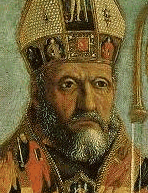November 13: Augustine of Hippo
Augustine of Hippo (354 CE)
It was also on this date, November 13, 354, that Augustine of Hippo – Aurelius Augustinus – the brilliant Roman Catholic Church Father, was born in Tagaste (Souk-Ahras), in what is now Algeria. He had a wild youth until, at age 33, after fathering a son out of wedlock, Augustine sobered up. He had been a Manichaean for many years, but rejected that heresy, adopted neo-Platonism, but failed to get a buzz from that and, influenced by Bishop (later Saint) Ambrose, was finally ordained a Christian priest in 391. The belatedly pious Augustine became Bishop of Hippo at age 42, in 396.
The Roman Church considers Augustine an oracle from the Middle Ages, so it is useful to remember that he was quite the product of his time, if not wholly relevant to our own. Augustine did not just reject but sneered at the claim by the early Roman popes of supremacy over the worldwide church – nevertheless, he supported the Papal policy of persecuting all non-Christians and schismatics; having observed it himself, Augustine denounced the general corruption of monasteries, which first appeared in Europe in his time; he derided the newly introduced cult of Mary and of the martyrs.
Augustine was one of the chief Christian defenders of the institution of slavery, preaching that it is a divine ordination; he was deeply superstitious, so much so that he believed dinosaur fossils were the remains of the giants spoken of in Genesis; and Augustine was seriously contemptuous toward women, believing they were created solely for the purpose of bearing children.
Augustine's prodigious literary output has not all survived, but we have 113 books and treatises, over 200 letters, and over 500 sermons he composed by the time he died on 28 August 430 at age 75. His most famous works are the Confessions (399) – a tale of a rake reformed – and Of the City of God (413-426) – a rambling apology that the fall of civilization doesn't matter because God's City is where Christians are destined to reside. Freethinkers can measure their success by how much unlike St. Augustine's vision the world has become.
Originally published November 2003 by Ronald Bruce Meyer.


